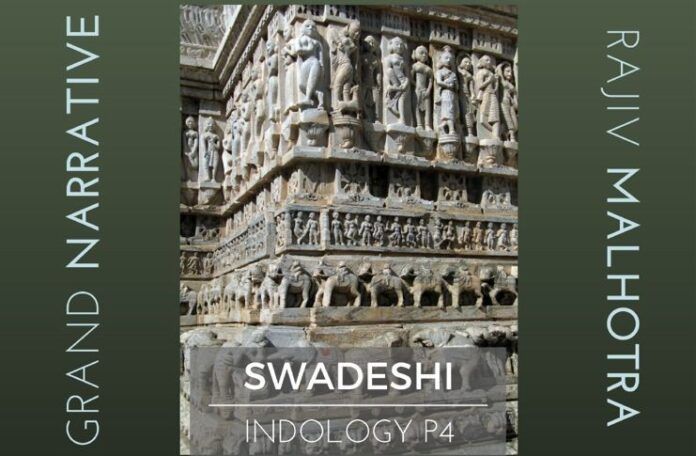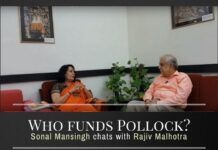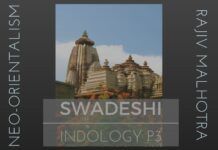
Part 1 of this series can be accessed here. Part 2 is available here. Part 3 talks about the abuse of Sanskrit as an oppressor language. This is Part 4.
[dropcap color=”#008040″ boxed=”yes” boxed_radius=”8px” class=”” id=””]S[/dropcap]o I gave a talk to these Foreign Service Institute people, this is after Modi’s election about a year or so ago. And the room was divided into two kinds of young people. Half of them were very proud, they said this is so good. Some speaker has come to tell us this, we wish we had more. They wanted my card, they wanted to learn more, they wanted to know what to read because a sense of pride was in them and they felt it was very important as diplomats to know these things and we would like to learn. But the disappointment is the other half were vocally upset at the topic. One of them stood up and said, “I am from North-east, I don’t believe in this Indian Grand narrative. What is this Indian Grand Narrative?” Another one said, I am a Dalit and I think what you are describing as the Indian Grand Narrative are the people who oppressed my ancestors. So this business of fault lines, Dalit faultlines, Dravidian faultlines, minority faultlines that I’ve talked about in some of my books, this is also in the diplomatic service. It means this kind of person who is going to represent us. What kind of representation are we getting with these people? It’s like you have a Vice-President of Sales, he doesn’t like your brand, he doesn’t like your product, he thinks there’s something wrong in your product. Why would you have such a person? So, to be a diplomat, there should be some kind of a patriotism requirement. It cannot be that you just passed an exam based on knowledge, and get into IAS, IFS in any subject. So just because you are smart in some subject doesn’t mean your ethos in your values system are naturalistic.
If you are a doctor, it’s not about feeling good, you have to be truthful. If the patient has a problem, you have to tell him that.
Then you look at the media, I don’t have to tell you, you see it everyday. The media is highly colonized. Then you look at the think-tanks in the NGO’s and the confused majority of the Indians. The other thing I noticed is that even with the new government, the different ministries don’t have an integrated, unified cohesive view of civilization or a nodal agency or an overall grand narrative of India which they all subscribe to. There is no overall keeper of the Indian civilization narrative. I don’t find that. And I am hopeful it will happen in the near future but so far it is an issue.
Now, I’ll tell you why our scholars have let us down. The current scholars who were supposed to be helping our side, why do I feel that they are not up to the standard. A lot of them want to feel good. If you are a doctor, it’s not about feeling good, you have to be truthful. If the patient has a problem, you have to tell him that. You got to be tough on this. We have some serious issues, and it’s not about feeling good emotionally when we get together. It’s not about brotherhood or emotional outburst. That’s not what the Swadeshi Indology has to be. It is not an emotional movement. It’s a very serious intellectual work, a very clinical work that we have to do.
[dropcap color=”#008040″ boxed=”yes” boxed_radius=”8px” class=”” id=””]I[/dropcap] find that lot of these ‘Sammelans’(gatherings) going on, you can attend a new one everyday. Every 365 days you can keep travelling from one lit fest to another or one conclave to another, all over the India. But these people are only talking, they are really not producing serious research output. It doesn’t happen in a room. You can talk about your research in a room but for doing the research, you have to do that in your place of work. I just don’t see that output of heavy research. What we lack is a strategic vision, with concrete deliverables, plans, dates, deadlines, budget and tough rigorous evaluation. We need to make systemic changes.
If you got to be a batsman, you got to face the toughest bowler the other side has.
So, I find a lot of our senior thinkers, are busy in like-minded meetings, like a cocoon talking to each other, feeling good, but how many are really going into the Kurukshetra, facing the opponent. You have to face the opponent. If you got to be a batsman, you got to face the toughest bowler the other side has. You have to do that. You can’t just be in a room and feel happy with others in your own team. This requires to be emotionally and psychologically very strong. That’s the ‘Kshatriyata’. You have to be an emotionally tough guy and also intellectually very committed and willing to take pain because this is not an easy work. It will take you long years, like a scientist producing some new technology. He spends many years to produce useful output.
I also find that there is a disconnect between where the capabilities are and where the resources are. I find isolated people here and there who are very capable of producing output but they don’t have any resources. They are just alone without resources doing a lot of work. And then I see places with huge amount of resources but hardly any output. Big institutions, big resources but not a huge amount of output commensurate with that. So we need to match and bring the talent to where the resources are and connect them. That is the work I am hoping we are able to do.
[dropcap color=”#008040″ boxed=”yes” boxed_radius=”8px” class=”” id=””]N[/dropcap]ow, the next part of my talk is on Swadeshi Indology. Swadeshi Indology is the movement we are starting to deal with the issues I just mentioned. There are three or four parts to this. We want to first create knowledge. New knowledge has to be created. This new knowledge has to be both disruptive and constructive. Disruptive aspect is needed. You have to fight the enemy. He has camped out in the Kargil, you have to throw him out. It’s not like we’ll send him a box of mango and he will leave – it is not like that. It is a tough work, a painful work. And you have to be willing to do tough work. So disruption means you disrupt these Indologies, all these colonial Indologies. You take on their big stars, their top people and write critiques. So if I take on Wendy Doniger, I would spend a lot of time on it and of course it will get me into trouble but I don’t care. If I take on Sheldon Pollock, I’d do that. Next year, maybe we’ll take on Romila Thapar. Maybe we’ll take on these big media people. But we really have to do that. So, it is both disruptive and constructive.
So you need a combination of knowledge, human beings who are experts and institutional mechanisms.
Constructive means we also have to do research on all the great things about our civilization. The history of science, the history of mathematics, medicine, philosophy, we have to revive the agamas. We have to revive so many parts of our civilization that have atrophied, preserve manuscripts. IGNCA is doing a great job in that area.
So there’s both negative disruptive attack and also protecting our culture positively. Positive-negative, defense-offense, so both parts of the force are needed. So once we have knowledge of this kind then using this knowledge we have to train human resources. We have to educate a new generation of scholars and teachers who’d learn this knowledge and teach it. A lot of people are endowing chairs in Indology but they don’t have the knowledge that has to be taught. So when you endow a chair you are giving money and they are going to teach the old knowledge. So you are actually helping the enemy. Imagine if you want to change the diet of people that is served in the restaurant, make it more healthy. Suppose you want to do that. The wrong thing would be to fund the restaurant because they will keep supplying the old diet. You have to first create the new diet. You have to develop new cuisines, new recipes and you have to make sure that this work, they are healthy and cost-effective. And then you can train human resource – chefs, who know how to use that knowledge and then you can create institutions. So, the three steps are: Create the knowledge, create the human resource using that knowledge, and then create the institutions where this knowledge and these human resource are invested. So you need a combination of knowledge, human beings who are experts and institutional mechanisms.
These three we don’t have together. There is knowledge sitting somewhere but the guy has no institution. He’s developing the knowledge but he has no students to teach. Then there are people who have lots of students to teach but they don’t have anything proper and original to teach them. So this disconnect of knowledge, human resource and institutions needs to be brought together. This is a very important thing. And we need to create schools of thought. Vivekananda was a giant but there was no Vivekananda school of thought. Ramakrishna mission didn’t create, market and distribute anything. They have been for hundred years, they have huge resources, they did not create another Vivekananda. They did not create someone with that caliber to continue that work. I gave the example of Shri Deendayal Upadhyay, a great man, but we need to create many more like that to continue this work. Similarly, there is no Gandhian thought thinker after Gandhi himself. We can keep parroting, wear his clothes and spin the wheel but that’s not being Gandhian. Gandhian means a very audacious original thinker who diagnoses the problem very much from the indigenous native point of view, very Dharmic.
Part 5 of this series is the concluding segment.
Note:
1. Text in Blue points to additional data on the topic.
2. The views expressed here are those of the author and do not necessarily represent or reflect the views of PGurus.
You can get connected with Rajiv in any one of the following ways:
Join Rajiv Malhotra for his FB LIVE Broadcasts. Follow Rajiv on facebook.com/RajivMalhotra.Official
Twitter: https://twitter.com/RajivMessage
You Tube Video of Rajiv Malhotra: https://www.youtube.com/user/BreakingIndia
Rajiv’s discussion egroup: http://groups.yahoo.com/group/RajivMalhotraDiscussion/
Email address : Infinity.Foundation.India@gmail.com
- Part 2: Discussion between Dr. Swamy and Rajiv Malhotra - September 10, 2017
- Dr Subramanian Swamy In Conversation with Rajiv Malhotra - July 24, 2017
- P2 – Discussing the Digestion of Yoga with a White Hindu - July 3, 2017











Pgurus you are doing good work but please consider using a better template for your site and a new logo. Perhaps a new domain name without any acronym. Breaking India forces like Scroll, Quint, Wire are excellent at presentation and they also manage to “look” authentic to the uninformed. I humbly request you to engage a good team to redo your branding.